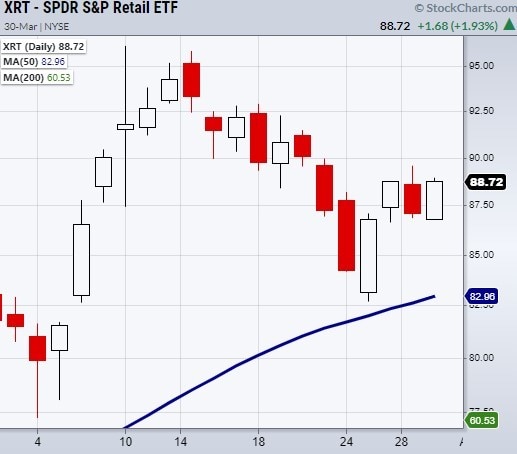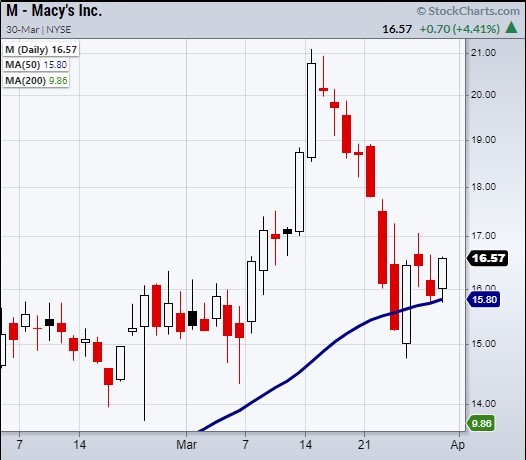In this article, Forrest Crist-Ruiz, assistant director of trading research and education at MarketGauge.com, analyses some of the factors effecting moves in retail.
Last Thursday, the SPDR S&P Retail ETF [XRT] opened near its 50-day moving average (DMA).

It closed with a large range on increased volume which was a good sign of strength.
Though it has not made a decent sized move since then, it has been holding its current price level.
Another factor is the iShares Transportation Average ETF [IYT], which made another new all-time high Tuesday.
IYTs strength helps the retail sector, because if the movement of goods is steady or growing and travel starts to pick up this will in turn support the retail space.
One company that pairs with the pullback in XRT is Macy’s [M].

The stock has done some consolidation around the 50-DMA at $15.80.
Additionally, its recent low of $14.76 is not far away from the current price, which makes for a good risk to reward setup.
If it can hold the current range and confirm a move upwards on increased volume, Macy’s could have upside potential back to $20–$21 area.
However, one thing to be wary of is finicky price action found in the Nasdaq 100 (represented by the Invesco QQQ ETF [QQQ]) and Russell 2000 (represented by the iShares Russell 2000 ETF [IWM]), which are both sitting under their 50-DMAs.
If they can clear their 50-DMAs, this would offer a boost to retail and the overall market.
But if not, stay cautious as a choppy market is one of the hardest markets to trade.
This article was originally published on MarketGauge. With over 100 years of combined market experience, MarketGauge's experts provide strategic information to help you achieve your investing goals.
Disclaimer Past performance is not a reliable indicator of future results.
CMC Markets is an execution-only service provider. The material (whether or not it states any opinions) is for general information purposes only, and does not take into account your personal circumstances or objectives. Nothing in this material is (or should be considered to be) financial, investment or other advice on which reliance should be placed. No opinion given in the material constitutes a recommendation by CMC Markets or the author that any particular investment, security, transaction or investment strategy is suitable for any specific person.
The material has not been prepared in accordance with legal requirements designed to promote the independence of investment research. Although we are not specifically prevented from dealing before providing this material, we do not seek to take advantage of the material prior to its dissemination.
CMC Markets does not endorse or offer opinion on the trading strategies used by the author. Their trading strategies do not guarantee any return and CMC Markets shall not be held responsible for any loss that you may incur, either directly or indirectly, arising from any investment based on any information contained herein.
*Tax treatment depends on individual circumstances and can change or may differ in a jurisdiction other than the UK.
Continue reading for FREE
- Includes free newsletter updates, unsubscribe anytime. Privacy policy



